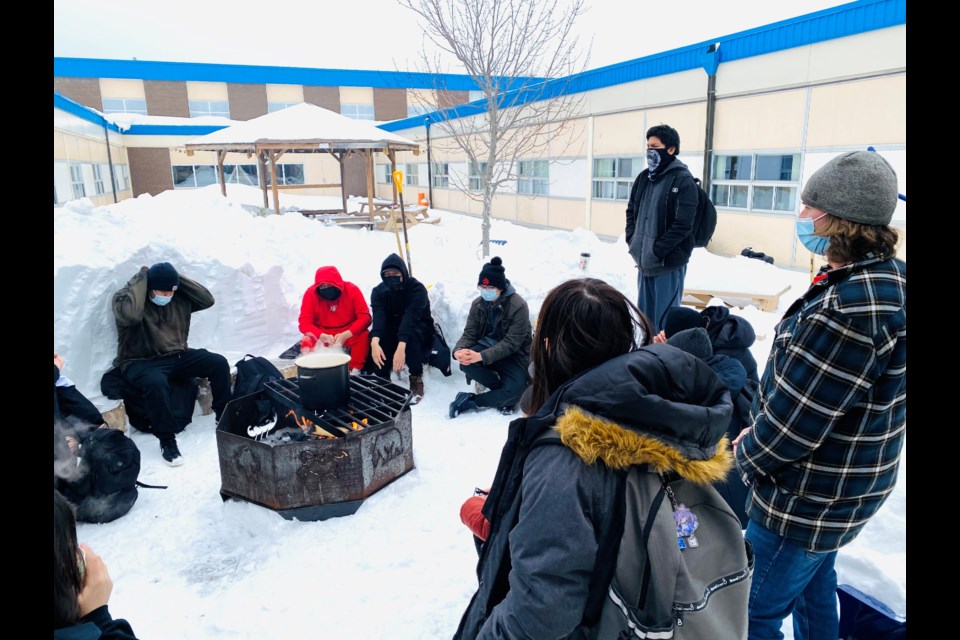THUNDER BAY – An alternative education program that offers land-based learning for Indigenous high school students in Thunder Bay has expanded during the pandemic.
The KZ Lodge program launched as a pilot project at Hammarskjold High School in 2018.
“They saw a need to provide an alternative program for Indigenous youth attending Hammarskjold High School, specifically focusing on Grade 9 students who’d be transitioning into high school – whether they’d be coming from Far North communities or just within their Grade 8 feeder schools," explains lead teacher Lisa MacLeod.
The program has now expanded to a second school in the public system, Westgate CVI, and become more flexible in welcoming students from upper grades.
Students earn credits through hands-on activities like skinning a deer or building a medicine garden, an approach MacLeod says has resonated.
“Just giving students those hands-on, special experiences really helps to ignite their enthusiasm,” she said. “It’s so different from the traditional classroom structure – you know, desks in rows. That’s not the KZ Lodge program at all.”
“Taking the students out onto the land helps to form those relationships… In some cases, for the Grade 9s, maybe helping them to face some of the fears they might have about coming to high school, or overcome some of the challenges they may have going on in their lives outside of school.”
The program’s not-so-secret ingredient, MacLeod says, is the foundational partnership with the Thunder Bay Indigenous Friendship Centre.
MacLeod works hand-in-hand with support worker Tanya Moses from the friendship centre to design lessons centred around activities like traditional hide tanning, fish stocking, hunter safety training, wild rice workshops, drum making, forest fire training, elder talks, and construction and welding.
A highlight for Moses is the community kitchen at Hammarskjold, where this year students will be able to cook with wild game every Friday and programming often runs in partnership with Roots to Harvest.
“We’ve been gifted with so many awesome professional relationships, different programs coming in and helping us,” said Moses, with other partners including the Ministry of Natural Resources, EcoSuperior, and ONWA.
Students are still taught to Ontario curriculum standards, MacLeod emphasized. Last semester, for example, they worked toward a bundle of credits including English, Green Technology, Indigenous Studies, Science, and Foods.
“The program was designed so students would still be working on all the regular high school credits,” she said. “We’re just doing it in a different way... we look to integrate hands-on experiences, and tie in those real-world connections as well as culture.”
In English, for example, the program has focused on Indigenous authors and highlighted connections to land, sometimes tying in outdoor lessons on trapping or fishing.
In Green Technology, the construction of a large medicine garden hit landscaping and horticulture components in the curriculum, and also involved traditional knowledge holders.
“There’s many ways to think outside the traditional box in terms of connecting what it is students are doing that’s hands-on back to things they can do on paper,” said MacLeod. “Just an activity like harvesting the deer – that can be connected to anatomy… it could be connected to literacy and writing assignments; it could be connected to a foods class… in terms of butchering and cooking that meat, and proper safe food handing.”
That particular activity is what caught the eye of Hammarskjold student Joanne Nodin several years ago.
“I was doing my regular classes, [and] I was struggling,” she said. “I heard they were doing some deer hide [tanning] out in the back and I wanted to go check it out.”
She wound up sticking around for the whole period, and now in Grade 12, she’s doing her co-op placement with KZ Lodge.
The program opened up opportunities to do things she’d never done before, and connect with culture, she said.
“Since I don’t really know much about my own culture, I thought it might be nice to know a little bit more and explore more with them,” she said. “I learned a lot more than I did before, in my other classes. This is something I actually get to do hands on, like go out, get in contact with more people that could possibly help me out with my future.”
MacLeod believes the program has had a measurable impacting, pointing to good overall attendance and a high level of engagement with the programming.
“Youth all face struggles in their educational experience,” she said. “But I do believe the supports the Friendship Centre provides to these students… I have to believe that’s what helps to bring some of these students just through the door every day. The connections to Tanya, to culture, all of those special things that are a little different than being in the mainstream class setting.”
The program’s impact is increasingly being felt beyond Hammarskjold and across the public board, working more with other classes, including elementary students.
Last year, KZ students worked with elementary classes at Woodcrest and Ecole Gron Morgan schools to assemble Eastern Bluebird nesting boxes, tying in traditions surrounding land-based learning, Ojibwe culture and language.
Notably, a second program known as KZ Lodge South has launched at Westgate CVI, also in partnership with the Indigenous Friendship Centre.
Moses believes the model is a strong one, noting other Ontario school boards have expressed interest.
“It went into Westgate, and I can see it going into other schools that are open to having it,” she said. “It’s like baby steps. We did this program for many years before we had this expansion… We actually showed there was a need and it was successful.”
“I think there’s always going to be room for expansion on this type of programming,” MacLeod agreed. “There’s so much benefit, and reconciliation efforts need to be at the front and centre of our educational system. And really, so many students can benefit from seeking new ways to learn.”



